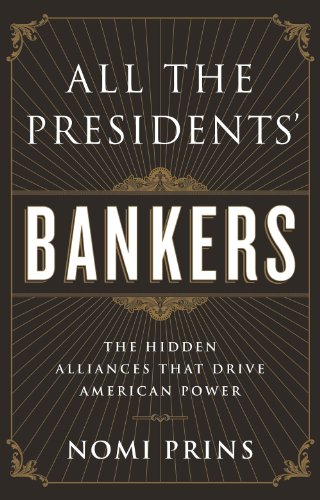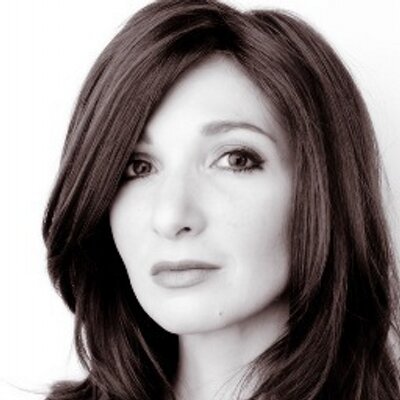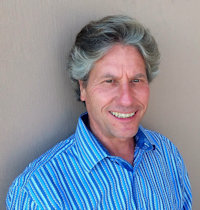All the Presidents' Bankers: The Hidden Alliances that Drive American Power

from amazon.com
Who rules America?
All the Presidents' Bankers is a groundbreaking narrative of how an elite group of men transformed the American economy and government, dictated foreign and domestic policy, and shaped world history.
Culled from original presidential archival documents, All the Presidents' Bankers delivers an explosive account of the hundred-year interdependence between the White House and Wall Street that transcends a simple analysis of money driving politics—or greed driving bankers.
Prins ushers us into the intimate world of exclusive clubs, vacation spots, and Ivy League universities that binds presidents and financiers. She unravels the multi-generational blood, intermarriage, and protégé relationships that have confined national influence to a privileged cluster of people. These families and individuals recycle their power through elected office and private channels in Washington, DC.
All the Presidents' Bankers sheds new light on pivotal historic events—such as why, after the Panic of 1907, America's dominant bankers convened to fashion the Federal Reserve System; how J. P. Morgan's ambitions motivated President Wilson during World War I; how Chase and National City Bank chairmen worked secretly with President Roosevelt to rescue capitalism during the Great Depression while J.P. Morgan Jr. invited Roosevelt's son yachting; and how American financiers collaborated with President Truman to construct the World Bank and IMF after World War II.
Prins divulges how, through the Cold War and Vietnam era, presidents and bankers pushed America's superpower status and expansion abroad, while promoting broadly democratic values and social welfare at home. But from the 1970s, Wall Street's rush to secure Middle East oil profits altered the nature of political-financial alliances. Bankers' profit motive trumped heritage and allegiance to public service, while presidents lost control over the economy—as was dramatically evident in the financial crisis of 2008.
This unprecedented history of American power illuminates how the same financiers retained their authoritative position through history, swaying presidents regardless of party affiliation. All the Presidents' Bankers explores the alarming global repercussions of a system lacking barriers between public office and private power. Prins leaves us with an ominous choice: either we break the alliances of the power elite, or they will break us.
https://www.amazon.com/All-Presidents-Bankers-Alliances-American-ebook/dp/B00IWGTYA6/
Author: Nomi Prins

Nomi Prins is a renowned journalist, author and speaker. She is currently at work on a new book, Collusion (formerly called Artisans of Money), that will explore the recent rise of the role of central banks in the global financial and economic hierarchy. Her last book, All the Presidents' Bankers, is a groundbreaking narrative about the relationships of presidents to key bankers over the past century and how they impacted domestic and foreign policy. Her other books include a historical novel about the 1929 crash, Black Tuesday, and the hard-hitting expose It Takes a Pillage: Behind the Bonuses, Bailouts, and Backroom Deals from Washington to Wall Street (Wiley,2009/2010). She is also the author of Other People’s Money: The Corporate Mugging of America (The New Press, 2004) which was chosen as a Best Book of 2004 by The Economist, Barron's and The Library Journal, and Jacked (Polipoint Press, 2006).
She has appeared on numerous TV programs: internationally for BBC, RtTV, and nationally for CNN, CNBC, MSNBC, CSPAN, Democracy Now, Fox and PBS. She has been featured on hundreds of radio shows globally including for CNNRadio, Marketplace, NPR, BBC, and Canadian Programming. She has featured in numerous documentaries shot by international production companies, alongside prominent thought-leaders, and Nobel Prize winners.
Her writing has been featured in The New York Times, Forbes, Fortune, Newsday, Mother Jones, Truthdig, The Guardian, The Nation, Alternet, NY Daily News, LaVanguardia, and other publications.
Her engaging key-note speeches are thoughtfully tailored, and she has spoken at numerous venues including at the Federal Reserve / IMF / World Bank Annual global central bank conference, the Purdue University/Sinai Forum, University of Wisconsin Eau Claire Forum, Ohio State University Law School, Columbia University, Pepperdine Graduate School of Business, Manhattan College, National Consumer Law Center, Environmental Grantmakers Association, NASS Spinal Surgeons Conference, and the Mexican Senate.
She was a member of Senator (and presidential contender) Bernie Sanders (I-VT) Federal Reserve Reform Advisory Council, and is listed as one of America's TopWonks. She is on the advisory board of the whistle-blowing organization ExposeFacts, and a board member of animal welfare and wildlife conservation group, Born Free USA.Nomi received her BS in Math from SUNY Purchase, and MS in Statistics from New York University, where she completed all required coursework for a PhD in Statistics. Before becoming a journalist, Nomi worked on Wall Street as a managing director at Goldman Sachs, ran the international analytics group as a senior managing director at Bear Stearns in London, and worked as a strategist at Lehman Brothers and analyst at the Chase Manhattan Bank.
Reviewed by: John Stokdijk

All the Presidents’ Bankers - The Hidden Alliances that Drive American Power by Nomi Prins is
... a story of relationships between powerful men; it is the financial political history of America, and it reveals not only how these alliances shaped America’s domestic and foreign policy but also, by extension, how America’s bankers shaped the world, and America’s position as a superpower.
This book may not of interest to many people. But I have a financial background and I would like to understand, as best I can, as much about the world I live in as is reasonably possible. The present state of American economic and political matters have deep historical roots which Prins explores in great detail.
Nomi Prins begins the story at the dawn of the twentieth century with events leading up to the panic of 1907 and the creation of the Fed, the Federal Reserve central banking system. Can a system created in 1913 still serve society effectively today? The answer to this and many other questions is beyond the scope of All the Presidents’ Bankers but the book contributes much important background.
For most of us, WWI is ancient history but for the United States it was an opportunity for Uncle Sam to begin his ascension to superpower status. America became important as a safe haven for foreign money and as seller of military hardware, still significant today. What I did not know but found interesting is that after WWI “The United States never ratified the Treaty of Versailles, nor did it join the League of Nations.”
The story moves on to the major event that shaped the lives of the parents of my generation, the Great Depression. That period became forever linked to us as we ourselves lived through the Great Recession in the aftermath of the financial crisis of 2007-2009. During that period of time I was well aware that Ben Bernanke was the Chairman of the Federal Reserve and that he was an expert on the Great Depression.
Prins summarizes the next few years after the Great Depression highlighting themes which still resonate today:
During the mid-1930s, the financiers who were focused on commercial banking pushed the FDR administration forward with additional regulations, while the private bankers remained sidelined. This internal power struggle in the industry coincided with a recession that shook up some of FDR’s banker alliances, as financiers began to think that it was time to reduce government intervention in the economy. All those domestic fights would fade, however, as it became increasingly clear that the country was headed to war, much to the chagrin of the isolationists in Congress.
The period immediately after WWII was of considerable interest to me because it shaped the world we live in today. The stage was set at Bretton Woods for the United States to dominate the free world with the formation of the International Monetary Fund, the World Bank and other global institutions. Intuitively, I agree with the words spoken in 2008 by French President Nicolas Sarkozy: "we must rethink the financial system from scratch, as at Bretton Woods." Again, I wonder what Nomi Prins has to say about this.
Having been born early in the 1950s, the story now moves into events which directly impacted my life. But I was still a boy intent on playing sponge ball and not yet engaged with world issues such as the Cold War. Nomi Prins describes my childhood years in nostalgic terms:
During the 1950s, Americans enjoyed a decade of domestic tranquility and growing middle-class security, to an extent that has not been experienced since then.
As a teenager I was reading Time magazine from cover to cover. Events referred to by Prins now take on new meaning and an air of familiarity - the Cuban Missile Crisis, the assassination of JFK, the Great Society, Vietnam, the assassinations of Bobby Kennedy and Martin Luther King Jr. But the story of bankers and banking against the backdrop of these traumatic events is a new perspective which I can appreciate now but would probably have had little significance to me at that time.
As a young adult in the 1970s, I was very interested in Big Business and I was reading Fortune magazine from cover to cover. My views were quite conservative and pro business at that time. It is unlikely that I would have read a book like All the Presidents’ Bankers.
But Watergate and the resignation of Richard Nixon in 1974 were a catalyst of my evolution into a left leaning member of society. Today I am interested in a more critical evaluation of that decade. I lived through those years of rising oil prices and high inflation but did not think very deeply about them then. I have no memory of the role money and bankers played in the resolution of the Iran hostage crisis. This book helps us understand how little we know about all that occurs that affects our lives.
The quote Nomi Prins selects as a caption for Chapter 16 brings back memories: “Greed is good.” —Gordon Gekko, Oliver Stone’s leveraged buyout king in Wall Street. I saw that movie. At that time in my own career I was in an entrepreneurial phase and I was interested in wealth creation for myself and others. In hindsight, all things considered, I am glad I did not succeed because I would probably not like the person I could have become.
The Reagan Years continue to generate controversy to this day. Living peacefully in retirement, I am hesitant to say all that is on my mind about his Presidency and it is not necessary to do so. The style of the book written by Prins is heavily descriptive rather than a judgmental evaluation. At times her attitude is implied but her paragraphs are not opinion pieces. However, I would very much like to hear her opinions as well as her prescriptions for the problems which she relates.
In the story of the 1980s are the stories of scandal, not at all surprising when greed is good. Chapter 16 includes the stories of Michael Milken and junk bonds and the story of Ivan Boesky and insider trading. It includes the rise of Alan Greenspan, a man who looked heroic until 2009.
1994 is interesting to me now in a way that I could not have imagined in 1994. I am now living in Mexico. In 1994 the North American Free Trade Agreement (NAFTA), championed by Bill Clinton, was implemented. 1994 was also the year of the devaluation of the Mexican peso. In 1994 I probably would not have considered Mexico as a place to enjoy retirement.
As the book approaches the financial crises of 2007 to 2009, Prins provides a succinct summary:
Over the decades, the faces at the helm of America’s two poles of power changed (though certain bank leaders remained in their seats far longer than presidents), but the aspirations of the unelected financial leaders coalesced with the goals of the elected leaders— occasionally to the benefit of the US population, often to its detriment, but always to drive America’s particular breed of accumulation and expansionary capitalism.
There are many events in the 2000s worthy of books and in fact multiple books have been written. All of us can only read a selected few. The events of 9/11 and their aftermath will be discussed for decades to come. All other stories are smaller but not insignificant. For those of us with financial backgrounds, the Enron and WorldCom stories are fascinating. The resulting Sarbanes-Oxley Act of 2002 touched my career in Calgary.
Nomi Prins published her book in 2014 but, as the quote below reveals, the story of American political and financial power was far from finished in the Great Recession.
Globally, economic conditions were abysmal. Throughout the Middle East and parts of Europe, youth unemployment topped 25 percent; in some places, it was double that figure. Country after country, from Greece to Spain to Ireland, struggled under immense debt and crippled economies. Governments pushed through austerity measures in conjunction with the supranational banks to make up for the debt incurred by losses from toxic securities, in the wake of a fraudulently stimulated global housing market. The general rage pushed people to the streets, from demonstrations in the Middle East and Europe to the US-launched Occupy movements, where anger was aimed at the bankers and the politicians who favored them.
No book report on All the Presidents’ Bankers would be complete without comment on the Notes. There are 1,627 notes at the end of the book! To say that All the Presidents’ Bankers is well researched is an understatement.
As impressed as I am with this book, I must take issue with its closing sentence:
Our choice is simple: either we break the alliances, or they will break us.
We live in a complex world and most of our choices are not simple. Those choices which are simple are not easy. We also need to consider the other side of the story which is far outside of the scope of this book. It is an undeniable fact that, all things considered and in spite of all the self-serving actions by politicians and bankers, the world of 2017 is better than the world of 1907 for hundreds of millions of people. How did that happen? That too is a story.
And perhaps the unhealthy alliances can be mitigated to a degree that actually benefits the average and ordinary person, although of this I am skeptical. Perhaps the unhealthy alliances will continue to bend us out of shape but will not break us and of this I am hopeful. For example, I wonder what the future impact of blockchain technology generally and digital currency specifically will be as a force to counterbalance the power of the political and financial elite.
In October 2017, Nomi Prins will speak in Ajijic at the joint invitation of the Ajijic Book Club and Democrats Abroad. The event will be open to the public. I am looking forward to meeting her and hearing all she has to say.
Reviewed by: Karl Homann

In her book, All the Presidents' Bankers, Nomi Prins uses her pen with the cool precision of a surgeon’s scalpel to dissect the body politique of the United States and lays bare the corrosive cancer of “corruption”. The author does not call it that, given that the leverage of big money in US elections and subsequent domestic and international policy decisions – at times even leading to wars – is “legal”. The European Union recently warned the Ukraine that it could not become a member of the Union unless it cleaned up the country’s pervasive corruption. What in other countries is called “corruption”, in the US has been legalized as “free speech”.
Without taking sides and based on voluminous research, Prins lays bare 100 years of presidential history and the cozy relationship between big bankers and US presidents, at the expense of ordinary people. In the process, she debunks, at least for me and hopefully for others, that the “shining city upon a hill” (Ronald Reagan), is but an obscure machination in the gloomy bowels of a banker’s vault and a deceitful conspiracy in the lights of flickering candles at exclusive banquets on off-limit islands.
For someone unfamiliar with Wall Street terminology, the reading is heavy at times, though the writing is straightforward and direct. The author also provides an extensive glossary of financial jargon at the end of her book. One thing, however, is abundantly clear: the US is not what it believes or portrays itself to be. Not a guiding beacon of democracy for the rest of the world, but a plutocracy, an oligarchy of the rich, a society controlled by its wealthiest citizens.
Secretary of State John Kerry said in his 2013 farewell speech in the US Senate:
There is another challenge we must address – and it is the corrupting force of the vast sums of money necessary to run for office… [that]…threatens to steal our democracy itself. I’ve used the word corrupting – and I mean… corruption of a system itself. The alliance of money and the interests it represents, the access it affords those who have it at the expense of those who don’t, the agenda it changes or sets by virtue of its power, is steadily silencing the voice of the vast majority of Americans...
And yet nothing happens. The truth requires that we call the corrosion of money in politics what it is: it is a form of corruption and it muzzles more Americans than it empowers, and it is an imbalance that the world has taught us can only sow the seeds of unrest. (The Boston Globe, January 30, 2013)
Nomi Prins entitles one of her later segments “Corporate Corruption Unleashed”, yet both the SEC and the Justice Department went soft on the banks and handed out “tepid” fines, even when the bankers admitted to illegal and even criminal practices. No banker went to jail. On the contrary, they were rewarded with a substantial government bailout.
The author ends her powerful book with a dire warning. “Our choice is simple: either we break the alliances, or they will break us.” Despite the author’s courageous and scathing exposure of the backroom dealings between bankers and presidents, I hold little hope for the former to happen in a nation that places the cynical slogan “In God (read “Mammon”) We Trust” on every dollar bill it prints. And, perhaps, the latter needs to happen again to bring the nation, at least for a while, to its senses.
Hopefully, All the Presidents’ Bankers will make a difference in the political choices of those who read it with an open mind.
Karl Homann
Reviewed by: John Stokdijk

For April 2018, the ABC book selection is No Ordinary Time: Franklin & Eleanor Roosevelt: The Home Front in World War II by Doris Kearns Goodwin. My review says nothing about the relationship between FDR and bankers because the book says very little about this aspect of his presidency. Below are excerpts from All the Presidents’ Bankers which adds to the story of FDR.
On March 12, 1933, eight days after he took office, FDR gave his first “fireside chat” radio address to the nation. The topic was the banking crisis. Millions of nervous Americans— a quarter of whom were unemployed— gathered around their radios to hear his address. These listeners, many of whom had seen their savings go with the closure of their banks, had a faint hope that there was light at the end of the tunnel.
FDR truly understood banking. He explained to his listeners that when people deposit money, banks invest it “in many different forms of credit— bonds, commercial paper, mortgages, and many other kinds of loans,” and that the “total amount of all the currency in the country is only a small fraction of the total deposits in all of the banks.” In other words, banks don’t keep a lot of peoples’ deposits in storage for stability…
FDR took care not to blame all the bankers for the country’s economic and credit problems...
A skilled tactician, FDR would strengthen the banking system with the help of his friends, the “good” bankers. For he understood something very important: his power and influence would be greater if he had the bankers on his side and solved the banking crisis for the population. The bankers, in turn, realized that collaborating with FDR would help elevate their own financial power later…
FDR restored public confidence in banking. He propped up capitalism and saved the bankers from themselves, with their blessings.
